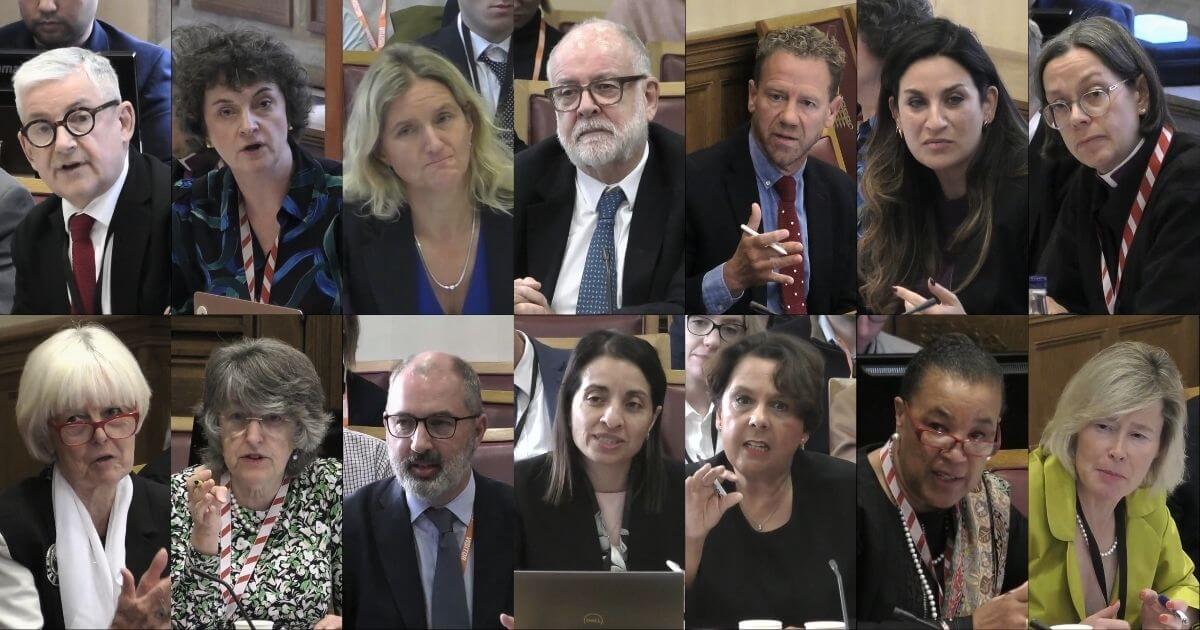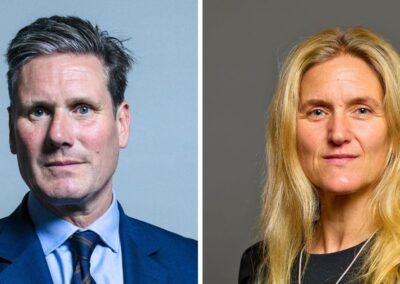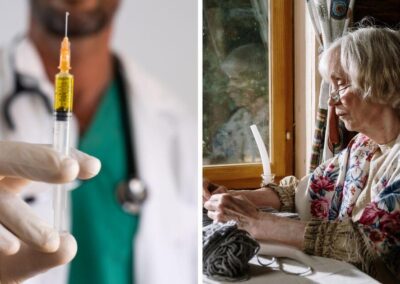The House of Lords assisted suicide Bill select committee held two public sessions this week, allowing a select group of Peers to interrogate and cross-examine the Terminally Ill Adults (End of Life) Bill through expert witnesses. In an unusual and controversial move, the select committee chose not to accept written evidence and only heard from a select few invited witnesses.
On Wednesday 22 October, in the first session, Bill sponsors Kim Leadbeater MP and Lord Falconer were questioned on their Bill,
This was followed in the second session by Professor Mumtaz Patel, President, Royal College of Physicians; Professor Nicola Ranger, General Secretary and Chief Executive, Royal College of Nursing; and Dr Michael Mulholland, Honorary Secretary, Royal College of General Practitioners.
The following contains a summary and key themes of the first day of the select committee.
Disability, assisted suicide drugs and the role of the physician
Sponsor of the assisted suicide Bill in the House of Lords, Lord Falconer, who is now undertaking his eighth attempt to change the law on assisted suicide since 2009, caused a significant backlash after responding to concerns about coercion and the impact of legalising assisted suicide on people with disabilities. Falconer suggested that the only issue for people with disabilities in relation to assisted suicide was to ensure they had additional assistance to ensure they too could be assisted in suicide.
“In relation to people with various learning difficulties or autism, again, with proper assistance, they too can have that option. Special care has to be taken, but that care can be taken, and the option is available to them as well”, he said.
Lord Falconer agreed to table amendments to ensure drugs used in assisted suicide do “not cause suffering”. However, nowhere in the world have such drugs been licensed.
The international experience of assisted dying
Alongside the sponsor of the Bill in the Commons, Kim Leadbeater, Falconer made reference to other jurisdictions in which assisted dying had been made legal. He claimed that assisted dying laws improve the “experience of death for a number of people”. However, he failed to note that for those who have ended their lives in the most recent year for which data is available, 45.3% cited being a burden in Canada, 42% did so in Oregon, 59% in Washington, and 35.2% did so in Western Australia.
Lord Falconer also failed to mention that Oregon has approved deaths linked to anorexia, arthritis and diabetes, and that one reported death is known to have taken more than five days.
He also suggested the safeguards on the assisted dying law in New Zealand “work” even though in the inaugural oversight committee of assisted suicide and euthanasia in New Zealand, one committee member resigned due to concerns about serious problems with the committee’s ability to oversee the implementation of the law, and another was pushed out, it is thought, because she was raising too many concerns about the operation of the new law. The committee members reported being “extremely concerned” about how little information they received relating to patient deaths.
At the same time, Kim Leadbeater told Peers that “[m]ultiple international experts gave evidence in the House of Commons”, failing to mention that every overseas witness invited supported assisted dying, and that other key groups – including representatives of vulnerable communities – were not heard.
Lord Falconer also suggested assisted dying laws lead to improvements in palliative care despite the fact that academic analysis has shown “clear indications in several jurisdictions of palliative and end-of-life care deteriorating in quality and provision following the introduction of [assisted dying], and a negative impact on some healthcare professionals”.
Terminology: autonomy, suffering and suicide
Both Falconer and Leadbeater insisted that “the essence of the Bill is autonomy”, saying that “suffering” was not a suitable requirement for receiving assistance in suicide because it is a “subjective matter”.
Over a year after the Bill was tabled, and despite claims that the Bill is “the safest piece of legislation in the world”, Peers noted that the Bill has been regularly revised and further changes are being contemplated, leading to questions about clarity and readiness.
Leadbeater said “We are still working on the detail”, to which Baroness Berridge asked “Could you, when you do your updates, consider any impact on the Online Safety Bill? Lord Falconer said that this is a well-thought-through piece of legislation. I do not think parents will agree with you, if we are still having to look at matters such as advertising at this stage, would they?”
Safeguards, appeals and process
Asked why families would not be able to appeal approvals for assisted suicide where they had concerns, Lord Falconer suggested this would create an “inflated court process” that would prevent the whole system from functioning and warned against an “over-engineered process”.
Kim Leadbeater had to admit that her multidisciplinary death panel is not a legal entity and would not require families to be heard or allow for cross-examination. Peers challenged whether this would command public confidence.
Physicians must be free to opt out
Professor Mumtaz Patel, President of the Royal College of Physicians (RCP), one of the largest medical royal colleges, with a membership of around 40,000, was called to give evidence during the second session of the Terminally Ill Adults (End of Life) Bill select committee.
When asked about the RCP’s view regarding the Bill in its current form, she highlighted significant “concerns”, particularly the desire among physicians to be able to withdraw at any stage of the process. She said the college has “a lot of concerns from our clinicians and physicians who wish to have that option of absenting themselves from any aspect of assisted dying”.
Dr Michael Mulholland, giving evidence on behalf of the Royal College of General Practitioners (RCGP), expressed the same concern saying “We do not want this to be part of core general practice”.
He added, “We would just like it, if a health professional is going to be involved, to be an opt-in process, because we know that many of our members, as GPs, do not want to be part of this”.
Decision-making and capacity
Professor Patel also expressed reservations about the decision-making process in the proposed legislation, saying it is “currently not clarified within the Bill as it stands”.
Dr Mulholland went further, explaining “[t]he whole question of making decisions for assisted dying is against everything that I have been trained in and I have practised for 30-plus years”.
Highlighting that for general practitioners, the outcome at the end of life has always been to care for and support the patient, he continued “The outcome at the end of life has been that we will support and care for you and provide palliative care, as best we can in the circumstances”.
Prognosis and drivers of choice
Professor Patel also reminded the committee of the difficulties surrounding prognostic certainty.
“Then there is prognostic uncertainty. That is something that we grapple with day to day, whether it is six months or different. It is so hard to make that very clear, that prognostic uncertainty, to both patients and their families, so it can be understood in that way”.
Professor Patel expressed concern about exacerbating existing health inequalities by introducing assisted suicide services: “Assisted dying as a service should not preclude and divert resources from the wider equity of access to all forms and services around end-of-life care”.
She later added “You do not want diverting of resources to make one happen at the compromise of another service”.
In her evidence, Professor Patel feared that people could choose assisted suicide because of lack of palliative care provision and inequity of services.
“What I really fear is that people are making, sometimes, these choices because of the lack of provision around good palliative care. Going back to the inequity of services, it feels really wrong and a lot of our members and fellows talk about that. Just where the disadvantaged populations are, there is service underprovision and then that inequity and gap is just going to get wider and wider. Those are some of the fears that are coming through our members and fellows”.
Professor Patel pointed to the strain on the NHS, noting that corridor care has become a reality, with end-of-life discussions sometimes taking place there.
Professor Nicola Ranger, general secretary and chief executive of the Royal College of Nursing (RCN), added, “We have to ensure that palliative care is invested in and thriving. Every patient should have the opportunity to have a symptom-free, dignified and pain-free death. That should be what we are striving for”.
Safeguards and raising assisted suicide
The Bill does not require clinicians to ask where a patient’s wish for assisted death originated; Ranger called this “coercion” if it results from external suggestion.
“I think that that would raise a red flag in a practical way if someone has suggested it to an individual. That is coercion”, she said.
Baroness Berridge raised concerns that young people could encounter material promoting or normalising assisted suicide, particularly through unregulated means such as social media, video games or AI, outside the Bill’s definition of “advertisement”.
“At Clause 43, we prohibit advertisements. There is no definition, though, in the Bill of ‘advertisement’. That word does not include what young people view through YouTube influencers, TikTok videos, video games or artificial intelligence, including ChatGPT, which parents might not be aware of”.
Baroness Finlay noted that while the Bill is presented as a response to rare cases of extreme pain, it contains no reference to pain at all.
“This Bill has been promoted on the basis of a solution to severe pain and suffering. You have spoken about other countries, other jurisdictions, that do include suffering in their legal definition. Why did you choose to not mention either pain or suffering anywhere in your qualifying conditions?”
Law and medical practice
Baroness Finlay also criticised the proposed two-tier appeals system, under which families would be unable to appeal approvals, while applicants could appeal rejections.
“Why is there no appeal mechanism in the event that somebody feels that an approval for lethal drugs should not have been given? There is only an appeal mechanism against a decision to not provide lethal drugs”.
Lord Goodman of Wycombe warned that assisted suicide could become a “core GP work”, to which Dr Michael Mulholland replied that the RCGP “would hope that this goes on to the face of the Bill that [the RCGP] would have a separate service”
Former Attorney General, Baroness Scotland, said there is no major problem with the current law that requires change. She reminded members that assisted suicide campaigners welcomed the 2010 DPP guidelines on assisted suicide at the time and questioned why that framework is now criticised.
“I think you will be more than conversant with the DPP guidelines that came out in February 2010, which were highly consulted upon and, indeed, received a lot of applause for the way in which they were undertaken”.












